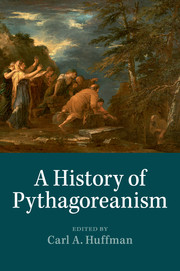Book contents
- Frontmatter
- Contents
- Contributors
- Abbreviations
- Introduction
- Chapter 1 Pythagoras
- Chapter 2 Philolaus
- Chapter 3 Archytas
- Chapter 4 Sixth-, fifth- and fourth-century Pythagoreans
- Chapter 5 The Pythagorean society and politics
- Chapter 6 The Pythagorean way of life and Pythagorean ethics
- Chapter 7 Pythagoreans, Orphism and Greek religion
- Chapter 8 The problem of Pythagorean mathematics
- Chapter 9 Pythagorean harmonics
- Chapter 10 The Pythagoreans and Plato
- Chapter 11 Aristotle on the “so-called Pythagoreans”: from lore to principles
- Chapter 12 Pythagoreanism in the Academic tradition: the Early Academy to Numenius
- Chapter 13 The Peripatetics on the Pythagoreans
- Chapter 14 Pythagoras in the historical tradition: from Herodotus to Diodorus Siculus
- Chapter 15 The pseudo-Pythagorean writings
- Chapter 16 Pythagoreans in Rome and Asia Minor around the turn of the common era
- Chapter 17 Diogenes Laertius’ Life of Pythagoras
- Chapter 18 Porphyry's Life of Pythagoras
- Chapter 19 Iamblichus’ On the Pythagorean Life in context
- Chapter 20 Pythagoras and Pythagoreanism in late antiquity and the Middle Ages
- Chapter 21 Pythagoras in the Early Renaissance
- Bibliography
- General index
- Index locorum
- Greek index
Chapter 17 - Diogenes Laertius’ Life of Pythagoras
Published online by Cambridge University Press: 05 May 2014
- Frontmatter
- Contents
- Contributors
- Abbreviations
- Introduction
- Chapter 1 Pythagoras
- Chapter 2 Philolaus
- Chapter 3 Archytas
- Chapter 4 Sixth-, fifth- and fourth-century Pythagoreans
- Chapter 5 The Pythagorean society and politics
- Chapter 6 The Pythagorean way of life and Pythagorean ethics
- Chapter 7 Pythagoreans, Orphism and Greek religion
- Chapter 8 The problem of Pythagorean mathematics
- Chapter 9 Pythagorean harmonics
- Chapter 10 The Pythagoreans and Plato
- Chapter 11 Aristotle on the “so-called Pythagoreans”: from lore to principles
- Chapter 12 Pythagoreanism in the Academic tradition: the Early Academy to Numenius
- Chapter 13 The Peripatetics on the Pythagoreans
- Chapter 14 Pythagoras in the historical tradition: from Herodotus to Diodorus Siculus
- Chapter 15 The pseudo-Pythagorean writings
- Chapter 16 Pythagoreans in Rome and Asia Minor around the turn of the common era
- Chapter 17 Diogenes Laertius’ Life of Pythagoras
- Chapter 18 Porphyry's Life of Pythagoras
- Chapter 19 Iamblichus’ On the Pythagorean Life in context
- Chapter 20 Pythagoras and Pythagoreanism in late antiquity and the Middle Ages
- Chapter 21 Pythagoras in the Early Renaissance
- Bibliography
- General index
- Index locorum
- Greek index
Summary
Introduction
We know very little about Diogenes Laertius as a person. One recent hypothesis is that his surname refers to his birthplace (the city of Laerte in Caria or Cilicia), but other interpreters prefer to think – on the basis of a controversial indication in his text – that he was born (and lived) in Nicaea in Bithynia; it is also generally admitted on the basis of the scanty and mostly negative internal evidence that he lived and worked at the beginning of the third century AD: the last philosophers he mentions are Sextus Empiricus (active c. 190 AD) and his disciple Saturninus, and the most recent source he refers to is Favorinus of Arelate. This approximate date helps us appreciate the chapter he devotes to Pythagoras at the beginning of Book 8 of his Lives (as I shall abbreviate the work known as Lives and Opinions of Eminent Philosophers), for it allows us to relate Diogenes’ treatment of Pythagoras to two philosophical movements deeply indebted to Pythagoreanism, i.e. Neopythagoreanism and Neoplatonism.
Neopythagoreanism, which goes back to the first century BC, must have still been vigorous during Diogenes’ lifetime. Thus, the fact that his own presentation of Pythagoras does not appear to be indebted to Neopythagoreanism is certainly significant, even if what this is significant of is more difficult to assess. Geographical marginality is probably not a good explanation, because Diogenes’ erudite work suggests – even if his actual sources are certainly fewer that those which are quoted – that he had access to a major library, perhaps that of Alexandria. It may also be that Diogenes Laertius was simply not interested in contemporary developments and more specifically that the Pythagoras of Neopythagoreanism, who is hardly more than a Platonizing-Aristotelianizing doctrinaire, was not especially attractive to him. As a matter of fact, one of Diogenes’ interests lies – as the title of his work indicates – in the person of any given philosopher.
Keywords
- Type
- Chapter
- Information
- A History of Pythagoreanism , pp. 360 - 380Publisher: Cambridge University PressPrint publication year: 2014
- 6
- Cited by

